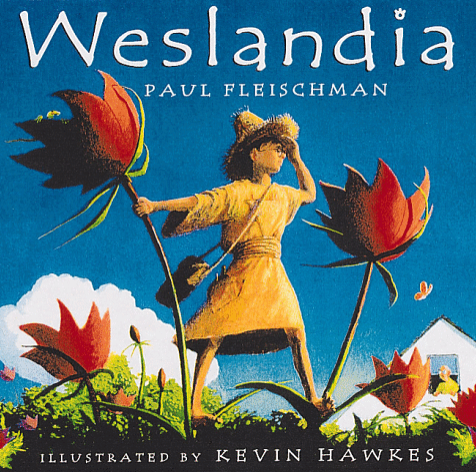May 2016

Weslandia
by Paul Fleischman
Enter the witty, intriguing world of Weslandia! Now that school is over, Wesley needs a summer project. He’s learned that each civilization needs a staple food crop, so he decides to sow a garden and start his own - civilization, that is. He turns over a plot of earth, and plants begin to grow. They soon tower above him and bear a curious-looking fruit. As Wesley experiments, he finds that the plant will provide food, clothing, shelter, and even recreation. It isn’t long before his neighbors and classmates develop more than an idle curiosity about Wesley - and exactly how he is spending his summer vacation.
A Note from the First Lady:
Dear Read20 Book Club families,
Summer is just around the corner and Paul Fleischman’s Weslandia is a terrific book to kick off your summer reading! You will be amazed by how Wesley spends his break establishing a new civilization in his own backyard. Starting from a staple crop, Wesley builds Weslandia up slowly creating his own architecture, writing, language, and art.
This story is also about how great things can come from embracing our differences. As you read the story, notice how Wesley begins as an outcast in his community. However, once others begin to notice the uniqueness of his creation, they all wish to be a part of Weslandia. I hope this book inspires you to be industrious, curious, and adventurous. And remember, sometimes wonderful things can come from not settling for what everybody else is doing!
Keep up the great reading,
Crissy Haslam
First Lady of Tennessee
Family Activities
- What characteristics of a civilization are discussed in Weslandia? Take time to dig deeper into an ancient civilization and research the Mayan, Egyptian, Babylonian, Native American, or Chinese. You can visit your local library to find information on the civilization’s culture, staple crops, clothing, housing, and games and recreation activities. Talk about how the ancient civilization might be similar or different from people living today. Tennessee has wonderful museums across the state with information about ancient civilizations and displays of artifacts. Visit this website to learn about visiting a museum near you!
- Wesley develops a new 80-character alphabet. Throughout history, different civilizations created their own alphabets as systems of communicating. The earliest alphabets, such as the hieroglyphics of the ancient Egyptians, were picture based and they eventually evolved into symbols for letter sounds. Create your own family alphabet. Think about how many letters and symbols you might need, considering the English alphabet consists of 26 letters.
- Wesley’s seeds took root in the garden, first as small seedlings, then shooting up past his knees, and then producing fruits. Discuss the different parts of a seed and of a plant. Plant your own seed in a backyard garden or in a pot or planter. Talk about how seeds need soil, air, water, and the right temperature and amount of light to begin to grow, or germinate. Students can take a field trip to the Tennessee Residence this summer to learn about how fruits and vegetables are grown in the Kitchen & Cutting Garden.
- Wesley was very resourceful finding uses for all the parts of his plants. Make a list of various plant parts. Next, try to find or name 3 household items that come from a plant. An example may be listing tea bags for leaves or perfume for flowers. Next, list 3 foods humans eat that come from a plant, like lettuce leaves in a salad or fruit in a smoothie.